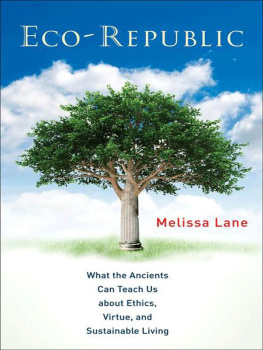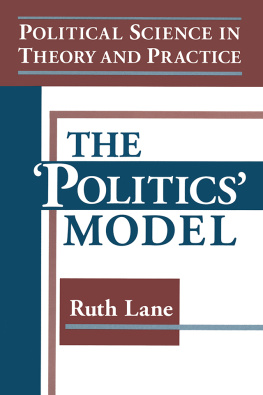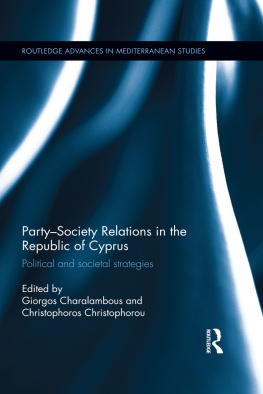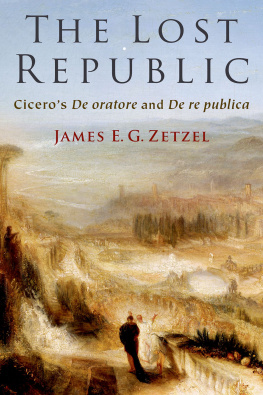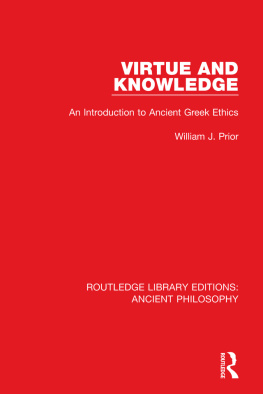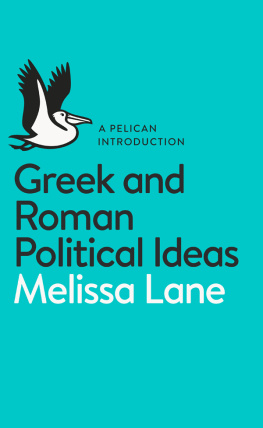
ECO-REPUBLIC
ECO-REPUBLIC
WHAT THE ANCIENTS CAN TEACH US ABOUT ETHICS, VIRTUE, AND SUSTAINABLE LIVING
MELISSA LANE
Princeton University Press Princeton and Oxford
Copyright 2012 by Melissa Lane
Requests for permission to reproduce material from this work should be sent to Permissions, Princeton University Press
Published in the United States and Canada by Princeton University Press, 41 William Street, Princeton, New Jersey 08540
press.princeton.edu
This edition of Eco-Republic is published by arrangement with Peter Lang Ltd
First published in 2011 by Peter Lang Ltd
Peter Lang Ltd
International Academic Publishers
Evenlode Court, Main Road, Long Hanborough, Witney,
Oxfordshire OX29 8SZ
United Kingdom
www.peterlang.com
All Rights Reserved
Library of Congress Control Number: 2011933429
ISBN: 978-0-691-15124-3
Printed on acid-free paper.
Printed in the United States of America
1 3 5 7 9 10 8 6 4 2
Acknowledgements
This book was conceived in Cambridge, England, and completed in Princeton, New Jersey, with sabbatical support provided by the University of Cambridge and Kings College, Cambridge, in spring 2009; research support provided by Princeton University from the time of my moving there in the summer of 2009; and a return summer in Cambridge made easier by the hospitality of the Centre for History and Economics and the Lauterpacht Centre for International Law. I am grateful to all these institutions and to the colleagues and staff in them, with special thanks to John Dolan, Carole Frantzen, Inga Huld Markan, Doug Rosso, and Debra Wintjen for making my logistical transitions work.
In Cambridge, the idea for the book grew originally out of the confluence between my study of Plato and of political thought and ethics more broadly, and the many opportunities given to me for over a decade by the Cambridge Programme for Sustainability Leadership, HRH the Prince of Waless Business and Sustainability Programme, and the Corporate Theatre, to convey why those ideas mattered to people in business, public policy, and charities in the UK, the US, and further afield. I cant begin to calculate my debt to Polly Courtice, Jonathon Porritt, Martin and Sue Best, and all staff and fellow faculty of these programmes, in particular Bill Adams, Bernie Bulkin and his partner Vivien Rose, Kate Owen, and Richard Newton. Thanks go to those who formed my knowledge of Greek thought Myles Burnyeat, Malcolm Schofield, and Dominic Scott and of political thought the late Judith Shklar and Quentin Skinner; and to the many colleagues, friends, and students who continue such conversations, especially colleagues of the B Caucus in Cambridge and the Program in Classical Philosophy in Princeton, my longstanding interlocutors in Platonic matters Danielle Allen and Verity Harte, and more recently Dimitri El Murr; and newer friends in the American academic community, especially Jill Frank, Sara Monoson, Arlene Saxonhouse, and John Wallach for their welcome. Conversations with Jimmy Doyle, Philippa Kelly, John Lambie, Gerry Mackie, Tori McGeer, Philip Pettit, Jeanne Safer, Stephanie Spink, and Richard Tuck were important. Environmentalists Tom Crompton, Jules Peck, and Joe Smith were challenging interlocutors in the UK, and my new environmental colleagues Bob Keohane, Michael Oppenheimer, and Rob Socolow have been similarly so in Princeton, where I am especially grateful to Steve Pacala for inviting me to join the Associated Faculty of the Princeton Environmental Institute.
Comments on various working papers related to the book were offered by seminar participants at the University of Cambridge, University of Utrecht, Hebrew University, Columbia University, LSE, University College London, and Princeton, with especially helpful written comments by George Kateb, and by readers of a Guardian article in 2009, especially Ian Christie. An earlier draft of the book was read with care and insight by Danielle Allen, Catherine Cameron, Dan Chandler, Antony Hatzistavrou, Jacob Lipton, and Jonathon Porritt, the latter especially generous given the demands on him at the time as Chair of the UK Sustainable Development Commission. A penultimate draft was read at speed and with philosophical acuity by Corey Brettschneider, Alex Guerrero, Antony Hatzistavrou, and Tim Mulgan. It was a special pleasure to write the beginning in Cambridge in the company of Adam Tooze and the end in Princeton in the company of Anne Hallward. I am indebted to my agent, Jonathan Conway; my editors, first Nick Reynolds and then Lucy Melville at Peter Lang, and Rob Tempio at Princeton University Press; Adam Freudenheim, Mary Fox, and Penguin Press for permission to quote throughout from the Sir Desmond Lee translation of Platos Republic published by Penguin Classics; and my calmly indefatigable research assistant, Julie Rose. Above all I thank Diana Lipton, who is a friend nonpareil; my sister Diana Lane, and her family, for being a model of ecological commitment; my parents Norman and Sheila Lane, for their unstinting love and generosity; and Andrew Lovett, my husband, partner, friend, and life companion, for sharing his creative passion and, in every way possible, nurturing mine.
My first book was dedicated to my parents, elders, and teachers, and my second book was about Platos progeny. This one is dedicated to the progeny of friendship, family, and teaching: Jacob and Jonah Lipton; Maud Hasler, Zia Ratnasothy, and Eliza Brown; all my younger cousins, nieces, and nephews; and my students, including the remarkable students of Plato whom I was privileged to teach in the Philosophy Summer School in China in 2007 as well as my students in both Cambridge and Princeton.
PART I
INERTIA
Prologue to Chapter 1: Platos Cave
[] what do you think would happen, if [a released prisoner] went back to sit in his old seat in the cave? Wouldnt his eyes be blinded by the darkness, because he had come in suddenly out of the sunlight? And if he had to discriminate between the shadows, in competition with the other prisoners, while he was still blinded and before his eyes got used to the darkness a process that would take some time wouldnt he be likely to make a fool of himself? And they would say that his visit to the upper world had ruined his sight, and that the ascent was not worth even attempting.
(The character of Socrates speaking in Plato, Republic, Book 7, 516e517a)
Crazy! Lunatic! What is he talking about? How dare he challenge our way of life?, people call out angrily to one another, hostile to a person newly arrived in their midst. The newcomer has challenged the fundaments of their social order. According to his presumptuous proclamation, what they call success is actually failure. Their career paths to power and prestige lead to public damage, not to public service. What they take to be solid facts are dangerous illusions. The technologies and infrastructure and assumptions in which they have invested their time and money and belief are fraudulent; the glare of reality would expose these as wishful delusions. The newcomer is likely to be shunned at best, stoned at worst. How could anyone be expected to tolerate such arrogant insults to their whole way of life?
Pull back the camera on this scene, however, and it appears in a new light. The busy self-righteousness of this political order is indeed, in reality, built on foundations of sand. The prizes they strive for are made of smoke and mirrors; success in their competitions is self-undermining. In fact, powerful figures, invested in the maintenance of this existing delusional social order, parade the objects and languages in which the people believe, denying that any external challenge to them could be valid. Denial of the external perspective looks from this higher vantage point like keeping ones head in the sand, refusing to face what is obvious and valid.
Next page
